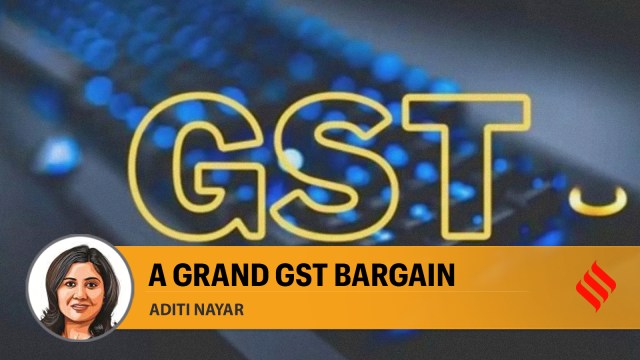
During the first five years of GST, there was a provision to compensate states for a loss of revenue, if any, measured against a 14 per cent growth over their “protected” revenues in 2015-16. The source of this compensation given to states was a cess that the Centre levied and collected on the sale of specific goods. This compensation cess was initially levied for a five year period. Subsequently, its levy was extended till March 2026, to service the loans raised during the Covid years for providing GST compensation to the states.
During July 2017 to March 2023, the government transferred Rs 8.8 trillion to 28 states as GST compensation grants (Rs 6.1 trillion) and loans (Rs 2.7 trillion). Nearly two-thirds of this total compensation was accounted for by 10 large states — Maharashtra, Karnataka, Gujarat, Punjab, Tamil Nadu, Uttar Pradesh, Kerala, West Bengal, Rajasthan and Madhya Pradesh. Notably, the percentage of GST compensation within each state’s revenue receipts varied substantially, with a higher dependence seen in states such as Punjab.
In the 54th GST Council meeting held in September, the government announced its decision to repay the entire GST compensation loan, amounting to Rs 2.7 trillion, by January 2026, two months prior to the cessation of the compensation period in March. As per our estimates, a surplus of around Rs 480 billion is likely to be left after repayment of the back-to-back compensation loans (Rs. 2.7 trillion) as well as the interest on these loans (Rs 0.5 trillion). This is slightly higher than the government’s estimate of Rs 400 billion.
Cess, as defined in the Constitution of India, can be imposed only for a specific purpose and is outside the divisible pool of resources between the Centre and the states. Looking ahead, the original purpose of introduction of GST compensation cess is no longer relevant, and the cess period had been extended legally to ensure the payment of back-to-back loans to the states during 2020-21 and 2021-22, which is to be completed soon.
In its September meeting, the GST Council recommended the formation of a Group of Ministers to study the future of the compensation cess beyond March 31, 2026, and how the surplus balance under the GST compensation fund would be used. If the council decides to continue the levy the compensation cess (by whatever name it may deem fit) on specified items beyond March 2026, the purpose for that would need to be identified and a constitutional amendment may also be needed.
The discontinuation of the compensation cess (without replacement by another tax/cess) would imply that the effective tax rates on demerit, sin and luxury goods (such as cigarettes, SUVs, pan masala, and tobacco items) would decline significantly. This appears somewhat unlikely as the government would want to tax these goods at high rates to discourage their consumption, suggesting that the “compensation” cess to continue, albeit in another form and with another name.
One option is for the compensation cess to be revamped into a new cess, for example, a green cess. The proceeds of this can be used to finance green infra projects and the energy transition requirements given that the government’s contribution and interventions will be critical for transition in key sectors in order to achieve India’s climate goals by 2030.
The council would need to consider the proportion in which such a cess would be shared between the Centre and the state governments to help them meet their transition commitments. Additionally, the horizontal devolution amongst the states would need to be considered. In our view, the finance commission devolution formula may not be appropriate for sharing such a cess.
So far, petroleum, oils, and lubricants (POL) products remain outside the GST net. One rationale for bringing them within the ambit of GST is to enable businesses to claim input tax credit on the same, which would help reduce costs and make them more competitive.
Further, given the varied tax rates across states, the retail selling prices of items such as petrol and diesel differ substantially in various parts of the country. This flexibility in taxation on POL products enjoyed by the states affords them a lingering modicum of fiscal autonomy, which the transition to GST had whittled away. Bringing POL products under the GST will certainly further compress the states’ autonomy.
To convince the states to bring POL products under the GST regime, a grand bargain would be needed. Perhaps, the cess proceeds could be used for compensating the state governments for losses, if any, due to this transition.
The writer is chief economist, head — Research & Outreach, ICRA



